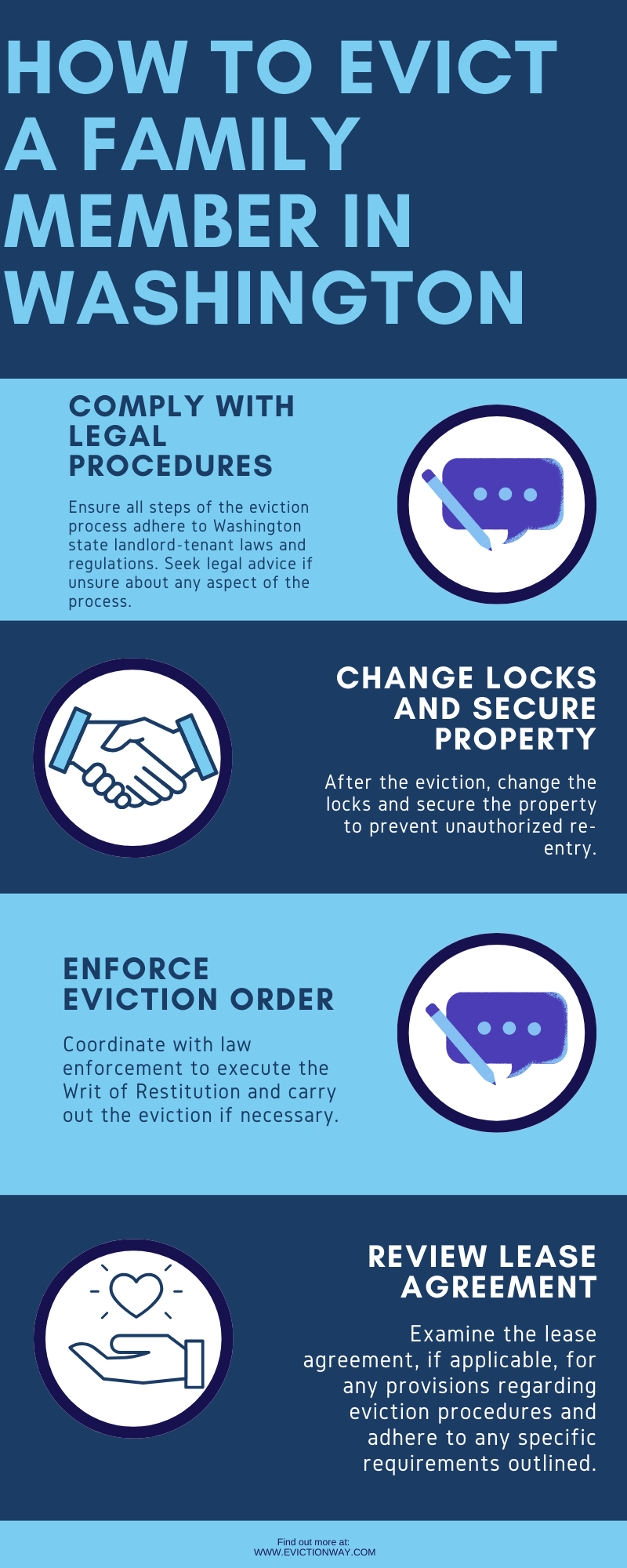Are you struggling to evict a family member in Washington? You’re not alone. Many people find themselves in this difficult situation. In this article, we’ll guide you through the legal process and provide tips on how to handle the situation with compassion and respect.
First, it’s important to understand the legal requirements for evicting a family member in Washington. The process can be complex, so it’s advisable to seek legal advice. An attorney can help you navigate the legal complexities and ensure that your rights are protected.

In addition to the legal process, there are also some practical tips that can help you evict a family member in a more amicable way. For example, try to communicate your decision to them in a clear and respectful manner. Explain your reasons for wanting them to leave and be willing to listen to their perspective. If possible, offer them help with finding a new place to live.
How To Evict a Family Member In Washington
Evicting a family member can be a difficult and emotional process. However, it is important to remember that you have the right to protect your property and your family.
1. Give Notice
The first step in evicting a family member is to give them written notice you must give the tenant at least 10 days’ written notice to vacate the property. This notice must state the reason for the eviction and the date by which they must vacate the property.
2. File a Complaint
If your family member does not vacate the property by the date specified in the notice, you will need to file a complaint with the court. The complaint should include a copy of the notice you gave to your family member.
3. Serve the Complaint
Once you have filed a complaint, you will need to serve it on your family member. This can be done by having a process server deliver the complaint to your family member in person.
4. Attend the Hearing
After the complaint has been served, a hearing will be scheduled. At the hearing, you will have the opportunity to present your case to the judge. Your family member will also have the opportunity to present their case.
5. The Judge’s Decision
After hearing both sides of the case, the judge will make a decision. The judge may order your family member to vacate the property, or they may dismiss the case.

6. Enforce the Judgment
If the judge orders your family member to vacate the property, you will need to enforce the judgment. This can be done by having a sheriff evict your family member from the property.
Additional Resources for Washington eviction help:
Eviction notice Washington
In Washington, Eviction notice indeed serves as a legal document that landlords can utilize when tenants breach their lease agreements.
This notice essentially notifies tenants that they rectify the violation or vacate the premises. It’s a crucial step in the eviction process and provides tenants with a final opportunity to resolve the issue before further legal action is taken.
You can download eviction notice Washington here.
14 days eviction notice Washington
In Washington, a 14-days notice to quit for non-payment of rent is a document used by landlords to inform tenants they’ve missed rent. It gives the tenant 14 days from the date they receive the notice to do one of two things:
- Pay the rent in full
- Vacate the property
If the tenant doesn’t comply within the 14 days, the landlord can then proceed with filing an eviction lawsuit in court.
You can download 14 day eviction notice Washington here.
How Much Does it Cost to Evict a Family Member in Washington?
The cost of evicting a family member in Washington can vary depending on the specific circumstances of the case. However, there are some general costs that you can expect to incur. These costs include:
| Action | Approximate Cost |
|---|---|
| Filing fee | $45 |
| Answer filing fee | $112 |
| Writ of possession | $40 + $30 (with aid of county) |
| Execution of writ of possession | $30 per hour |
| Legal fees | $500 – $10,000 |
| Average locksmith fees | $160 |
- Filing fees: The filing fee for an eviction lawsuit in Washington is $45.
- Service of process: The cost of serving the eviction notice to the tenant is typically between $50 and $100.
- Attorney fees: If you hire an attorney to represent you in the eviction process, you can expect to pay between $500 and $10,000.
- Court costs: If the case goes to trial, you may be responsible for paying court costs, which can vary depending on the length and complexity of the trial.
In total, the cost of evicting a family member in Washington can range from a few hundred dollars to several thousand dollars. It is important to factor in all of these costs when making a decision about whether or not to evict a family member.

FAQs: Evicting a Family Member in Washington
Here are some of the most frequently asked questions about evicting a family member in Washington:
What are the grounds for evicting a family member in Washington?
In Washington, you can evict a family member for the same reasons you would evict any other tenant, such as nonpayment of rent, violation of the lease agreement, or causing damage to the property.
Do I need to give my family member notice before evicting them?
Yes, you must give your family member written notice before evicting them. The notice period varies depending on the reason for eviction, but it is typically 10 to 30 days.
What is the process for evicting a family member in Washington?
The process for evicting a family member in Washington is similar to the process for evicting any other tenant. You must first give your family member written notice, then file a complaint with the court. The court will then schedule a hearing, where you will have the opportunity to present your case. If the court rules in your favor, you will be granted a judgment for possession, which will allow you to evict your family member.

Can I evict my family member if they are not on the lease?
Yes, you can evict your family member even if they are not on the lease. However, you will need to prove that they are a tenant, such as by showing that they have been paying rent or living in the property for a period of time.
What are some tips for evicting a family member in Washington?
Here are some tips for evicting a family member in Washington:
- Document everything: Keep a record of all communications with your family member, including any notices you give them and any conversations you have about the eviction.
- Be prepared to go to court: If your family member does not leave voluntarily, you will need to file a complaint with the court. Be prepared to present your case and provide evidence to support your claims.
- Get legal help: If you are not comfortable evicting your family member on your own, you can hire an attorney to help you.
Related:
